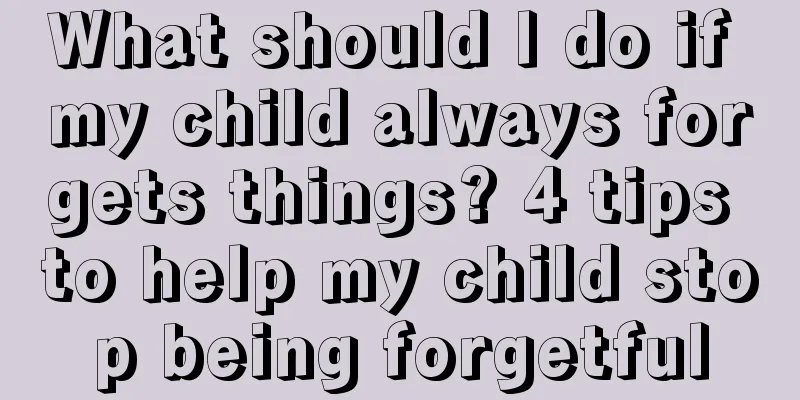What should I do if my child always forgets things? 4 tips to help my child stop being forgetful

|
Even though my child is already in kindergarten, he still forgets things from time to time. Today he forgets to bring his tableware, and tomorrow he forgets to bring his sportswear. Similar scenes happen every few days. Why do children tend to forget easily? Is the child's memory naturally poor? Is it related to concentration? Why can't children remember?When asked why children always forget things, clinical psychologist Li Huizhen said that parents should first consider the development of their children's cognitive abilities. Memory is a more complex ability that involves the joint operation of multiple brain regions. It requires the use of many brain functions, including vision, hearing, language comprehension and expression, attention, spatial concepts and organization, logical reasoning, etc. Only by integrating these abilities and information can we have so-called memory. Children who are usually between 2.5 and 6 years old can remember for a shorter period of time. They may remember something and then forget it. They can remember less content and are prone to time confusion. They cannot figure out the date and time and may mistake something that happened a few days ago for something that happened yesterday. Memory is about attentionAnother important ability before forming a memory is attention. Clinical psychologist Li Huizhen pointed out that when conducting child assessments, parents often complain that their children have poor memory and easily forget what they have learned, but in fact, most of it is affected by attention. When we receive a message or instruction, the first condition is whether we are concentrating on receiving the message. If we do not pay enough attention, the message will certainly not enter our memory system. The attention span of kindergarten children is relatively short and easily distracted. Looking back at the cognitive development at this age, some memories are acquired through a series of logical reasoning. For example, being able to see tomorrow's class schedule and knowing what to prepare for the corresponding items involves whether the child is able to anticipate what may happen throughout the day tomorrow (e.g., for a physical education class alone, the child may think: I may play until I'm sweating all over, so I need to prepare a towel, short-sleeved clothes, sneakers, a water bottle, etc.). In addition, in terms of language comprehension and expression, although children of this age can generally communicate smoothly, after further questioning the child about certain nouns, it is discovered that he does not fully understand them, so many times he may have memorized them by rote. All of the above factors will affect the memory performance of children of this age. What children need to rememberClinical psychologist Li Huizhen divides the events that children need to use their memory in kindergarten into two categories: daily chores and special events. These two types of events require a lot of help or reminders from parents before the children are in the middle class, that is, before they are 4 or 5 years old. Therefore, it is normal for children before the middle class to forget things. 1. Daily chores For example, they have to bring stationery, water bottles and spare clothes to kindergarten every day; if there is a football class this afternoon, they should prepare sports shoes, or they have to prepare handcraft materials for art class... etc. These are all tedious and messy things. For children, they are not fun at all, and they lack the motivation to use their memory or the so-called attention. Moreover, remembering these trivial things requires the use of logical reasoning skills, just like the above-mentioned tomorrow's schedule, which has its corresponding required items. This is a more complex ability for kindergarten children. Clinical psychologist Li Huizhen added that these logical reasoning abilities usually begin to develop after the age of 6. 2. Special Events After children enter the middle class, as their brain functions develop, they can begin to remember some special activities or things that the teacher specifically tells them to do, such as garden parties, sports meets, class parent-teacher meetings, outdoor teaching, etc. These things are usually quite interesting, and because children are looking forward to them, they can listen to the teacher's explanation attentively, thus increasing the children's motivation to remember. In addition, kindergarten teachers will constantly remind children and write it down in the contact book so that parents can tell their children again. These special activities usually happen in the near future. Clinical psychologist Li Huizhen said that for children in kindergarten and above, tomorrow is a time concept that is easier to understand, and the content of special activities is usually shorter, and there is not much to remember. It may be that tomorrow you need to bring a water bottle, wear sneakers, bring candy, etc., about 3 to 5 items, which are of course easier for children to remember. How to make your child unforgettable1. Keep instructions brief and concise When parents convey instructions, they should be brief and concise, and confirm whether the child has understood or received the message. How do you know whether the child understands the instructions? Clinical psychologist Li Huizhen said that a common practice is to ask the child to repeat it again. However, the content of the instructions should be very simple, such as 1 or 2 sentences or 3 to 5 things, so that it is not too much for the child. 2. Use pattern reminders If parents want their children to remember something in daily life, clinical psychologist Li Huizhen recommends that parents use pictures, drawings, whiteboard drawings and rhymes as reminders. For example, if parents want their children to brush their teeth and wash their face after getting up in the morning, they can draw a cute pattern and put it next to the bed so that the child can see it when he wakes up, which will help the child remember what to do. 3. Develop a daily routine Developing a routine in daily life is also the key to helping children remember! Children will have certain fixed schedules every day. Parents can divide the goals into several small steps and let the children do it by themselves. After completing each step, they can move on to the next step. Clinical psychologist Li Huizhen said that many parents mistakenly believe that as long as the time comes and the children are old enough, they will naturally do it, so they help their children do it now; however, when the children do not develop a habit, they will be too lazy to do it themselves even if they have enough ability. 4. Learn from games The premise of having a good memory is to have attention. Children must first listen attentively to the other party's conversation before they can remember the content. Games are the best and most natural activities to promote the all-round development of preschool children. Through the pleasant game interaction process, children naturally learn to listen carefully to what the other party is saying, so that they can know how to respond next; or when playing with toys, you get the red building blocks, I get the green building blocks..., it is natural for children to remember which ones are theirs so as not to get confused during the game. |
>>: Can pregnant women eat Baxian fruit? Who are not suitable for eating Baxian fruit?
Recommend
How to teach children to obey traffic rules
The number of deaths in car accidents is increasi...
How to supplement nutrition if the baby is too thin
Every child's growth and development is diffe...
Can pregnant women eat goose meat to supplement protein?
Pregnant women can eat goose meat, which is a hig...
Pick up your child from school: 3 things parents should avoid
The first thing is uncivilized behavior. If paren...
How long is the early stage of pregnancy?
The early stages of pregnancy are from the first ...
What to do if your baby keeps crying due to bloating
Since babies cannot express themselves verbally, ...
GuLi Wallet App Software-GuLi Wallet Loan Entrance
Introduction to GuLi Wallet If you are still a nov...
Should salt be added to complementary foods for 6 months?
When the baby is 6 months old, he can start eatin...
What kind of body type is suitable for taking Tianxi Pills? What kind of body type is suitable for taking Tianxi Pills?
Nowadays, with the development of the Internet, m...
At what age does a baby stop wetting the bed? At what age does a baby stop wetting the bed?
Bedwetting is a necessary process for every baby....
What is the best age for a woman to have a second child?
Research has found that the best age to have a se...
Where is the best place to hit a child if he or she is disobedient? Is it really okay to hit him or her?
When children are disobedient, the first thing th...
Is it necessary to wear nursing bra? See if you need it
Whether it is necessary to wear nursing bras depe...
What should you prepare in your maternity bag? The most complete list of maternity bags recommended by mothers
Giving birth is a painful and happy process, but ...
How to promote your baby's intellectual development and physical coordination
If babies find sounds interesting, dance with joy...









